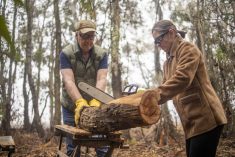Where is “You don’t talk about money!” written in the farm family rule book?
Recently on a coaching call, a farm family admitted a huge “undiscussabull” within the family had caused great stress to their over-40-year-old son. This non-farming son did not have any clue about the profitability of the farm, what the parents needed to live on, or what the plan going forward was for income streams, labour, and the type of enterprise that would be making money. The parents had assumed he was just not interested in the farm at all. Wrong assumption.
Read Also

Maintain motion to ease joint stiffness
As we proceed into colder, drier temperatures, it’s common to hear reports of more joint stiffness and pain, athletic therapist Kathlyn Hossack writes.
When your adult children are not coming forward to talk about money expectations, you as the parents can take the lead. Family meetings are the forum to get clarity of expectations.
Dick Wittman of Wittman Consulting is now in his 70s, and he’ll tell all farm families, “If you are in business together, partners should be able to talk freely about their business wealth and also the personal side of their financial realities. The two go hand in hand.”
A veterinarian in my audience agrees with Dick. “Elaine, our partnership buyout would have gone so much smoother had we realized what the personal wealth expectations and needs of our exiting partner were. There were too many unmet expectations and surprises in the buyout process.”
What is your plan to be able to talk more freely about money on your farm?
What is the story you are telling yourself suggesting “It’s nobody’s business about how I spend my money”?
I hope you would agree with me “the emotional factors around money affect the farm transition process.” Mix emotions with money and unmet, unspoken expectations and you have a recipe for farm drama, legal battles and unresolved conflict.
What is a more helpful approach?
Figure out what money means to you. Bruce Sellery’s book Moolala: Why Smart People Do Dumb Things With Their Money addresses this question. Bruce is a good friend of mine, and podcaster of “Money Made Simple.” I suggest you start tuning in to increase your vocabulary to talk more freely about money. Money to me is a form of energy or resource to create solutions. For younger folks in my audience, it means survival and a way to pay off debt. Older farmers see money as security and freedom.
How much debt can you sleep with? Do you expect to be debt-free by a certain age? Are you a young farmer who is afraid of large debt or has not been taught how to cashflow debt at a reasonable workable level? Our coach Glenn Dogterom can help you figure out what is a reasonable debt load. If you are the farm parent expecting to transfer farm assets without any debt, you may have unworkable expectations in 2024. Does your spouse understand the different levels of current, intermediate and long-term debt? If spouses are fighting about farm debt your transition plan will be stuck.
Mine your data. Look at your bank statement for clues as to your patterns of spending and revenue. Can you accurately share with your successors and farm business partners what you are spending on family living? A young farm successor disclosed he needed $60,000 for mortgage and shop debt, and $80,000 for living, which is $140,000. This leaves no room for TFSAs or debt servicing for growth of his business to buy into his parent’s equity. Many farm families need $75,000 to $85,000 for family living. Do you know what your family living number is? Once the family needs — not wants, necessarily — are met, you carve out allocations for other expenses. Hog farmers have told me they can live on $18,000 a year in the lean times and $50,000 in the good times. Frugality is a great gift, but the next generation may be more accustomed to “Amazon”-style living. Measuring what you spend, and sharing the data, will help you have a concrete conversation about where you may be able to make changes to accomplish your financial goals.
Learn how to read and understand financial statements and share them. I suspect you don’t want to feel stupid asking your accountant, lender or investment broker to help you get more financially literate, but we all start at the beginning of our learning and keep growing. Many farm women who have not been actively involved in the finances of the farm business have been shocked when they start learning about their net worth and the responsibility of managing wealth when they become widows. Why wait until death strikes? Grab the bull by the horns and be proactive about your financial education journey. Get your accountant to spend time helping you understand balance sheets.
Suppertime conversation starts with young teens and their queries. As entrepreneurs we talked about money, risk, debt, loss and all kinds of financial issues at our supper table with our teenagers. We also defined what confidentiality meant so there was no fear of spreading information to peers. Positive conflict resolution involves creating solutions. If you have a culture in your farm family of not owning up to financial mistakes and making repairs together, you likely don’t have an open culture of talking about money problem solving. You get to choose how you want to change the culture of “not talking about money.”
Ask your parents to tell stories about the hard times in farming. Tears flowed at a family succession meeting when it came to light through the father’s story he was carrying a lot of emotion around how hard his parents had worked to keep the farm going. “Times were so tough we sometimes woke up in the cold with our eyelids frozen together.”
Deep emotion from past stress may be creating fear of failure for the future finances of the farm. Ask, “What are you afraid of, Dad?” You might be surprised at the answer. When fears are disclosed, you can then start unpacking the thinking and feelings you need to navigate to create new money scenarios.
Set a date for a family meeting. Get expectations and curiosities out in the open so you can create solutions. Bring some financial data to the meeting. Be clear about confidentiality and define what that means to everyone in the room. Share with each other what money means to you, your hopes and goals for the future.
Imagine how good it is going to feel when you can freely talk about money in your farm family.
















